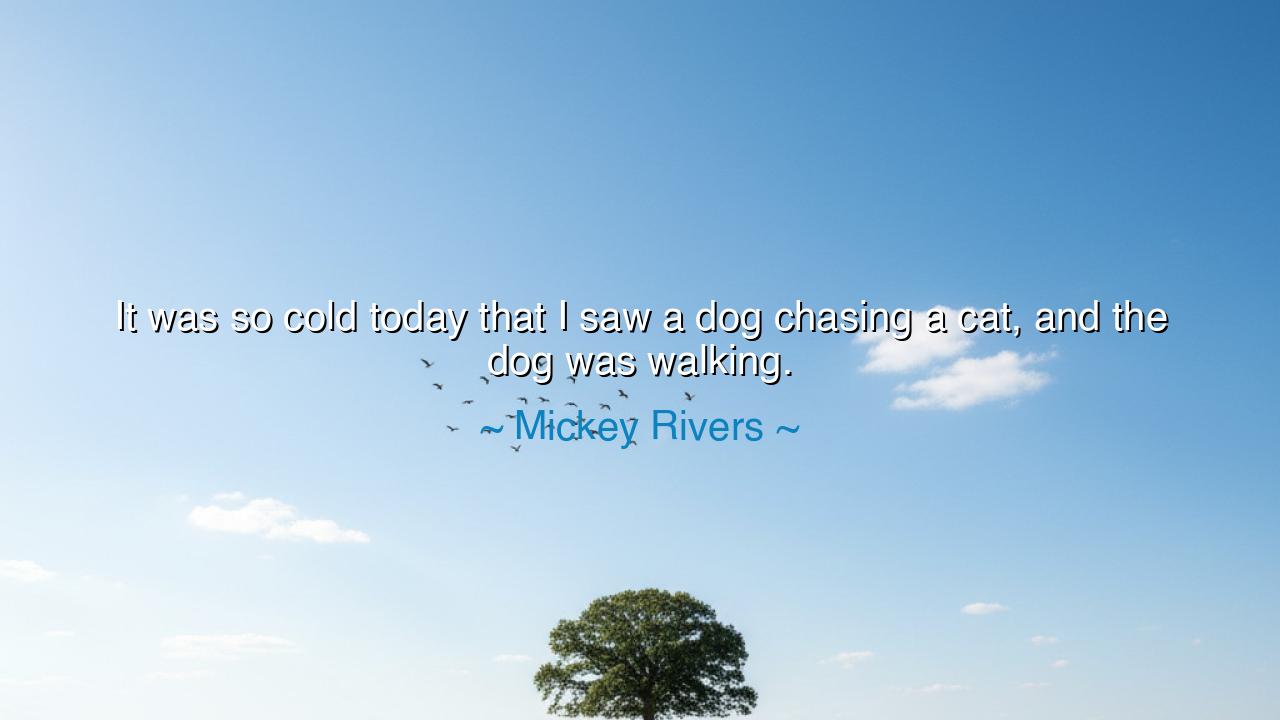
It was so cold today that I saw a dog chasing a cat, and the dog






Hear now, O children of wonder, the words of Mickey Rivers, spoken with jest but filled with hidden wisdom: “It was so cold today that I saw a dog chasing a cat, and the dog was walking.” At first, we laugh at the image, for it is absurd: the eternal chase of dog and cat, slowed not by choice but by the sheer weight of cold. Yet within this humor is a teaching profound—when the elements of life grow harsh, even the fiercest instincts are subdued. The natural order itself bends before the force of hardship.
For the cold in this saying is not only of weather, but of life’s seasons. There are winters of the body, when frost bites the skin, but also winters of the soul, when weariness dulls desire, and trials slow the race of daily striving. In such moments, we, like the dog, cannot run as once we did. The chase becomes a walk, and the fire of instinct gives way to endurance. The quote reminds us that no matter how natural our habits, circumstances shape our pace. The wise learn to adapt, rather than to despair.
Consider the tale of Napoleon’s army in Russia, swallowed by winter’s breath. Men who had marched with the fury of conquest slowed to a crawl, their fire extinguished by hunger and frost. Horses froze where they stood; soldiers staggered instead of charged. Like Rivers’ dog walking, they were humbled by the cold. It was not valor nor cowardice that slowed them, but the power of circumstance. This history teaches us that even the mightiest are bound to the seasons, and wisdom lies not in defying the storm, but in knowing when to conserve strength.
So too in the life of endurance runner Ernest Shackleton, who led his men through the frozen wastes of Antarctica after their ship, Endurance, was trapped and destroyed by ice. In the endless cold, survival meant not racing, but enduring, step by step, breath by breath. The chase of ambition became the walk of survival. Yet in that walk, in that patience, they found the strength to outlast despair. Here too, the lesson of Rivers’ saying shines: when cold slows you, do not curse it—adapt to it, and endure.
The meaning is thus revealed: life will bring you seasons of fire, where you may run with passion, and seasons of frost, where you may only walk. Do not despise the walking. The dog still pursued the cat, though slowly. Progress, even when slowed, remains progress. Let not pride or impatience blind you to the truth that there is honor in persistence, even when speed is impossible. Cold may hinder you, but it cannot halt you if your spirit continues forward.
The lesson for your own life is this: when hardship comes—when you feel frozen by failure, grief, or exhaustion—do not demand of yourself the sprint of summer. Walk instead, with steady steps. Conserve your strength, but do not stop moving. Like the dog, you may not chase with the same speed, but your perseverance keeps the pursuit alive. The warmth will return, and when it does, your spirit will be ready to run again.
Practically, this means embracing patience. If your goals feel stalled, remind yourself that winter seasons are part of every journey. Take smaller steps; do what you can, not what you wish you could. Allow yourself humor, as Rivers did, for laughter lightens even the heaviest frost. And most of all, remember: walking is not failure. Walking is survival. Walking is the promise of future running.
So, O listeners, carry this truth: in times of cold, when your instincts falter and your strength is slowed, do not despair. Laugh at the season, adapt to its pace, and trust that warmth will come again. For the wisdom of Mickey Rivers, cloaked in humor, is eternal: even in the fiercest winter, life goes on—not always running, but always moving forward.
––






AAdministratorAdministrator
Welcome, honored guests. Please leave a comment, we will respond soon